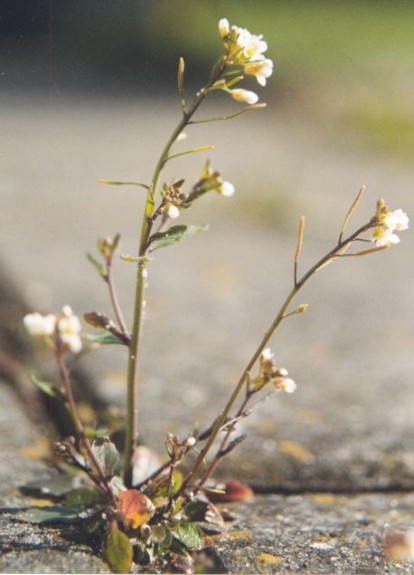On the International Space Station, Glow-in-the-Dark Plants Let You Know When They’re Stressed
To fight climate change or to grow crops in space, we need to know how plants respond to stress
Right now, astronauts on the International Space Station live on periodic supply drops, but if we’re ever going to really live in space, with colonies on other planets or aboard interstellar transports, we’ve got to figure out the food situation. Plants have spent their entire history growing under Earth’s gravity, and biologists know that living in zero-G stresses them out. But to really figure out exactly how plants get stressed meant killing the plant and cutting it open—an herbal autopsy.
On the ISS, says NASA, researchers are growing a strain of genetically engineered plant that glows when and where it gets stressed. With this tool, researchers can track how these plants are affected by living in space without having to cut them down. The researchers are using a heavily researched flowering plant called Arabidopsis thaliana, more commonly known as thale cress. According to NASA, the research is important for learning how plants can grow in preparation for “future long-duration exploration.”

Arabidopsis thaliana. Photo: Wikimedia Commons
But more than just being about growing plants in space, the scientists want to use the cress to understand the fundamentals of how stressed-out plants might adapt to climate change. So, they’re deliberately trying to stress the cress out, “exposing the plant to extremes of pressure, temperature, and drought.”
This isn’t the first thing we’ve genetically modified to glow-in-the-dark, either. In Japan, says David Biello, researchers used jellyfish genes to make glow-in-the-dark cats. We’ve also got glowing tobacco, that lets you know when it needs to be watered. And a still-ongoing Kickstarter campaign wants your help to grow glowing-plant technology, and they’ll give you a glowing arabidopsis to do so.
More from Smithsonian.com:
Food, Modified Food
What Will Convince People That Genetically Modified Foods Are Okay?
/https://tf-cmsv2-smithsonianmag-media.s3.amazonaws.com/accounts/headshot/smartnews-colin-schultz-240.jpg)
/https://tf-cmsv2-smithsonianmag-media.s3.amazonaws.com/accounts/headshot/smartnews-colin-schultz-240.jpg)